Introduction
Good health and hygiene are important for every child. As a parent, you can help your child learn healthy habits early in life. However, talking to children about health and hygiene can be tricky. You need to keep things simple, positive, and age-appropriate. Fortunately, with the right approach, you can teach these habits with ease. Let’s explore how you can do that step by step.
Start with Basic Concepts
First of all, begin with simple ideas. Children understand better when you use short and clear sentences. For example, you can say, “Washing hands keeps us clean,” or “Brushing teeth fights germs.” Then, you can slowly explain why these actions matter.
Additionally, use examples from their daily life. For instance, if your child just played outside, say, “Your hands touched dirt, so now we wash them to stay healthy.” As a result, your child starts to connect hygiene with real-life actions.
Use Fun and Friendly Language
Next, keep the conversation light and fun. Children respond better when the topic sounds friendly. Instead of saying, “You must brush your teeth or they will rot,” say, “Let’s brush to keep our smile shiny!”
Moreover, you can add songs or games. For example, sing a short song while they wash their hands for 20 seconds. This makes the routine enjoyable. Eventually, the habit becomes natural without pressure.
Explain the Importance Clearly
At the same time, explain the reason behind hygiene habits. Say things like, “We wash our hands to remove germs,” or “We take a bath to feel fresh and clean.” Children love asking “why,” so answer in a way they can easily understand.
Also, avoid scary or negative language. Don’t say, “You’ll get sick and go to the hospital if you don’t clean up.” Instead, say, “Clean hands keep us strong and happy.” Positivity helps your child feel good about healthy choices.
Be a Good Example
Most importantly, show good habits yourself. Children watch and copy their parents. When you wash your hands, brush your teeth, or cover your mouth when you cough, your child will notice.
Therefore, always follow the same advice you give your child. If you stay clean and healthy, they will feel encouraged to do the same. Consistency builds trust and respect between you and your child.
Turn Hygiene into a Routine
After introducing hygiene steps, turn them into daily routines. For example, always brush teeth after waking up and before bedtime. Always wash hands before meals, after using the toilet, and after playing outside.
Because children thrive on routines, they remember things better when they follow a pattern. Step by step, these habits will become a normal part of life.
Furthermore, create a chart or checklist. Let your child put a sticker each time they complete a hygiene task. This motivates them and gives a sense of achievement.
Use Stories and Role Play
Another great way to teach is through stories. Read books that talk about germs, cleanliness, or visiting the doctor. Use stories where characters learn about hygiene. Your child will enjoy the story while learning something useful.
Additionally, try role play. Act as the doctor or dentist, and let your child be the patient. Through play, they learn without feeling scared or forced. Role play helps them feel comfortable and confident about health topics.
Talk About Feelings and Body Changes
As your child grows, start talking about how the body changes. Use simple and respectful words. If they feel confused or shy, be calm and patient. For example, say, “It’s okay to have questions about your body. I’m here to help.”
Also, explain that everyone has the right to be clean and feel safe. Teach them how to take care of their body and when to ask for help. These talks create trust and build confidence.
Teach Through Questions
Instead of giving long lectures, ask questions. For example, say, “When do we wash our hands?” or “What do we do after using the toilet?” Let your child think and answer. Then, guide them if they get it wrong.
By asking questions, you make the conversation active. Your child feels involved and important in the learning process. As time goes on, they remember things better because they thought about them first.
Praise and Encourage
Always praise your child for trying. Even if they forget or make mistakes, stay kind. Say things like, “Good job washing your hands!” or “I’m proud you brushed your teeth without being told.” Positive feedback keeps them motivated.
In contrast, avoid yelling or punishing when they forget. Gentle reminders work better. For example, say, “Let’s go back and wash hands together.” Your support helps them feel loved and willing to learn.
Use Visual Aids
To make things even easier, use pictures or posters. Hang a chart near the sink showing the steps for handwashing. Show them how to brush all parts of their teeth. You can even print a morning and bedtime routine list.
Because children learn through visuals, these tools help them remember and understand better. Over time, they begin to follow the steps without help.
Conclusion
In conclusion, teaching your child about health and hygiene is a journey. Start with simple ideas, explain clearly, and use fun ways to teach. Always lead by example, offer praise, and stay positive. Bit by bit, your child will develop strong hygiene habits that last a lifetime.
Above all, keep the conversation open and kind. Your child will learn to take care of their body with love and pride. And when they grow up, they will thank you for it.

